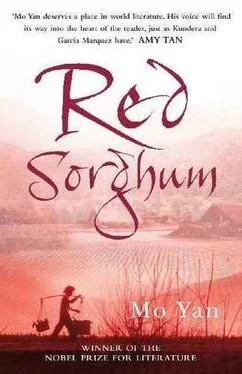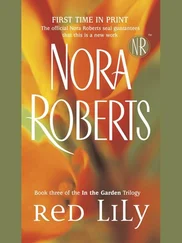For the first time in his life, Father noticed two trickles of tears slipping down Granddad’s hardened face. Granddad fell to his knees beside Grandma’s body and closed her eyes with his good hand.
In 1976, when my granddad died, Father closed his unseeing eyes with his left hand, from which two fingers were missing. Granddad had returned from the desolate Japanese mountains of Hokkaido scarcely able to speak, spitting out each word as though it were a heavy stone. The village held a grand welcoming ceremony in honour of his return, attended by the county head. I was barely two at the time, but I recall seeing eight tables beneath the gingko tree at the head of the village set with jugs of wine and dozens of white ceramic bowls. The county head picked up a jug and filled one of the bowls, which he handed to Granddad with both hands. ‘Here’s to you, our ageing hero,’ he said. ‘You’ve brought glory to our country!’ Granddad clumsily stood up, and his ashen eyeballs fluttered as he said, ‘Woo — woo — gun — gun.’ I watched him raise the bowl to his lips. His wrinkled neck twitched, and his Adam’s apple slid up and down as he drank. Most of the wine ran down his chin and onto his chest instead of sliding down his throat.
I recall our walks in the field; he held my hand and I led a little black dog with my other hand. His favourite spot was the bridgehead over the Black Water River, where he would stand supporting himself on one of the stone pillars for most of the morning or most of the afternoon, staring at the bullet holes on the bridge stones. When the sorghum was tall, he would take me into the field to a spot not far from the bridge. I suspected that was where Grandma had risen to heaven — an ordinary piece of black earth stained by her blood. That was before they tore down our old home.
One day Granddad picked up a hoe and began digging beneath a catalpa tree. He picked up some cicada larvae and handed them to me. I tossed them to the dog, who chewed them up without swallowing them. ‘What are you digging for, Dad?’ asked my mother, who was anxious to go to the dining hall. He looked up at her with a gaze that seemed to belong to another world. She walked off, and he returned to his digging. When he’d dug a pretty deep hole, he cut through a dozen or so roots of varying thicknesses and removed a flagstone, then took a misshapen tin box out of an old, dark brick kiln. It crumbled when it fell to the ground, revealing a long, rusty metal object taller than me, which was showing through the rotting cloth wrapping. I asked what it was. ‘Woo — woo — gun — gun,’ he said.
Granddad laid the rifle on the ground to soak up the sun, then sat down in front of it, his eyes open one minute and closed the next, over and over and over. Finally, he got to his feet, picked up an axe, and began chopping up the rifle. When it was no more than a pile of twisted metal, he took the pieces and scattered them wildly around the yard.
‘Dad, is Mom dead?’ Father asked.
Granddad nodded.
‘Dad!’ Father shrieked.
Granddad stroked Father’s head, then drew a small sword from his hip and chopped down enough sorghum to cover Grandma’s body.
A blast of gunfire erupted on the southern dike, followed by sanguinary shouts and the sound of exploding grenades. Granddad dragged Father over to the bridgehead.
At least a hundred soldiers in grey uniforms burst from the field south of the bridge, driving a dozen or so Jap soldiers onto the dike, where they were cut down by bullets or run through with bayonets. Father saw Detachment Leader Leng, a holstered revolver hanging from his wide leather belt, surrounded by several burly bodyguards. His troops were flanking the burning trucks and heading west. The sight drew a strange laugh from Granddad, who planted his feet at the bridgehead, pistol in hand, and just stood there.
Detachment Leader Leng swaggered up. ‘You fought a good fight, Commander Yu!’
‘You son of a bitch!’ Granddad spat out.
‘We almost made it in time, good brother!’
‘You son of a bitch!’
‘You’d be done for it if we hadn’t arrived!’
‘You son of a bitch!’
Granddad aimed his pistol at Detachment Leader Leng, who flashed a signal with his eyes. Two ferocious bodyguards quickly forced Granddad’s arm down. Father raised his Browning and fired into the ass of the man holding Granddad’s arm.
The other guard sent Father reeling with a kick, then stepped on his wrist, bent down, and picked up the Browning.
The bodyguards tied up Granddad and Father.
‘Pocky Leng, open your dog eyes and take a look at my men!’
The dikes on both sides of the road were strewn with the bodies of dead and wounded soldiers. Bugler Liu was still sounding his horn intermittently, but blood now flowed from the corners of his mouth and from his nose.
Detachment Leader Leng removed his cap and bowed towards the sorghum field east of the road. Then he bowed to the west.
‘Release Commander Yu and his son!’ he ordered.
The bodyguards let them go. Blood was seeping through the fingers of the man who was holding his hand over his wounded ass.
Detachment Leader Leng took the pistols from the bodyguards and returned them to Granddad and Father. His troops were rushing across the bridge, past the trucks and the Jap bodies, gathering up machine guns, carbines, bullets, cartridge clips, bayonets, scabbards, leather belts and boots, wallets, and razors. Some jumped into the river, where they captured the Jap hiding behind the stanchion and raised up the old Jap’s body.
‘This one’s a general, Detachment Leader!’ one of Leng’s officers shouted.
Detachment Leader Leng excitedly looked over the railing. ‘Strip off his uniform and pick up everything that was on him.’ He turned back and said, ‘We’ll meet again, Commander Yu!’
The bodyguards fell in around him as he headed to the southern edge of the bridge.
‘Stop right there, Leng!’ Granddad bellowed.
Detachment Leader Leng turned and said, ‘Commander Yu, you’re not planning on doing anything foolish, are you?’
‘You won’t get away with this!’ Granddad snarled.
‘Tiger Wang, leave Commander Yu a machine gun.’
A soldier walked up and laid a machine gun at Granddad’s feet.
‘You can have the trucks and the rice they’re carrying.’
Detachment Leader Leng’s troops crossed the bridge, formed up ranks on the dike, and marched east.
The trucks were nothing but charred frames by the time the sun was setting; the stench from the melted tyres was nearly suffocating. The bridge was blocked by the two undamaged trucks at either end. The river was filled with water as black as blood; the fields were covered with sorghum as red as blood.
Father picked up a nearly whole fistcake from the dike and handed it to Granddad. ‘Here, Dad, eat this. Mom made it.’
‘You eat it!’ Granddad said.
Father stuffed it into Granddad’s hand. ‘I’ll get another one,’ he said.
Father picked up another fistcake and savagely bit off a chunk.
WHAT TURNS THE sorghum of Northeast Gaomi Township into a sweet, aromatic wine that leaves the taste of honey in your mouth and produces no hangover? Mother told me once, making sure I understood that I was not to give away this family secret, for, if I did, not only would our family’s reputation suffer, but if our descendants ever decided to set up another distillery they’d have lost their unique advantage. Without exception, the craftsmen from our neck of the woods live by a simple rule: they would rather pass on their skills to their sons’ wives than to their daughters. This established practice carries the same weight as the law in certain countries.
Читать дальше












